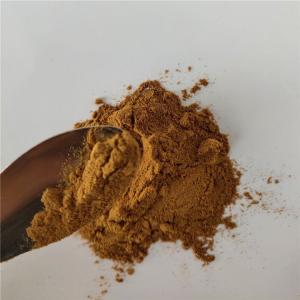

Add to Cart
PAOA/Polygonatum Adoratum Extract In Bulk
Product Details
Latin Name: Polygonatum odoratum
Product Specification: 10:1, polysaccharides 20%, 50%
Plant Part Used: whole plant
Extract Method:Water/Ethanol
Product Description
Polygonatum, King Solomon's-seal or Solomon's Seal, is a genus of
about 50 species of flowering plants. In the APG III classification
system, it is placed in the family Asparagaceae, subfamily
Nolinoideae (formerly the family Ruscaceae). It has also been
classified in the former family Convallariaceae and, like many
lilioid monocots, was formerly classified in the lily family
Liliaceae.
Some species of this genus have medicinal properties, and some (in
particular P. sibiricum) are used as a tisane in Korea, which is
called dungulle.
Some Polygonatum shoots are edible, cooked like asparagus, as are
the roots - after appropriate treatment - being a good source of
starch.
Product Analysis
| Item | Specification | Result | Method |
| BasicProduct Information | |||
| Product name | polygonatum odoratum extract | ||
| Part of the Plant | Whole plant | Conform | / |
| Country of Origin | China | Conform | / |
| Organoleptic Data | |||
| Appearance | Fine powder | Conform | NLS-QCS-1008 |
| Color | brown powder | Conform | GB/T 5492-2008 |
| Odor& Taste | Characteristic | Conform | GB/T 5492-2008 |
| Process Data | |||
| Solvent(s) Used | Water and ethyl alcohol | Conform | / |
| Extract ration | / | Conform | |
| Content | Paeoniflorin≥98% | 98.19 | |
| Drying Method | Spray drying | Conform | / |
| Excipient | Maltodextrin | Conform | / |
| Physical Characteristics | |||
| Particle Size (80 mesh) | 98.0%pass 80mesh | Conform | GB/T 5507-2008 |
| Moisture | <5.0% | 3.4% | GB/T 14769-1993 |
| Ash Content | <4.0% | 1.5% | AOAC 942.05, 18th |
| Solvent Residue | Eur. Pharm | Conform | NLS-QCS-1007 |
| Heavy Metals | |||
| Total Heavy Metals | <10 ppm | Conform | USP <231>, method II |
| Arsenic | <1.0 ppm | Conform | AOAC 986.15, 18th |
| Lead | <1.0 ppm | Conform | AOAC 986.15, 18th |
| Mercury | <0.5 ppm | Conform | AOAC 971.21, 18th |
| Pesticide Residue | |||
| 666 | <0.2ppm | Conform | GB/T5009.19-1996 |
| DDT | <0.2ppm | Conform | GB/T5009.19-1996 |
| Microbiology | |||
| Total Plate Count | <1,000cfu/g | 18cfu/g | AOAC 990.12, 18th |
| Total Yeast & Mold | <100cfu/g | 9cfu/g | FDA (BAM) Chapter 18, 8th Ed. |
| E. Coli | Negative | Negative | AOAC 997.11, 18th |
| Salmonella | Negative | Negative | FDA (BAM) Chapter 5, 8th Ed. |
(1). effect on heart small amount of yu zhu decoction or tincture
strengthens the invitro heart of frogs, while large amount weaken
the heart rate, or even stop the hearts.
(2). effect on blood vessels: when given 20% decoction to the the
blood vessels of frogs, caused the blood vessels to contrict.
Giving 20ml of venous injection to dogs, caused the kidney volumn
to shrink.
(3). effect on blood pressure: giving 20% of yu zhu decoction of 1,
2 and 5ml of venous injectin s to domestic rabbits cause the blood
pressure to rise slowly but giving small dosage of 5 ml to dogs
under anesthesia, caused the blood pressure to lower temporary.
(4). effect on blood lipids and arteriosclerosis: using yu zhu
injectiones in muscle injection or in stomach feeding can prevent
the rising of triglycerides but cholesterol had risen after
administering the herb.
(5). effect on blood sugar: giving domesticated rabbits venous
injection of 2 yu zhu extract of 0.5/kg, has caused the blood sugar
to lower, but stomach introduction has caused the blood sugar to
rise initially and to lower eventually. It can obviously inhibit
the effect of of raising blood sugar by the epinephrine.
(6). effect on intestines:20% decoction can initially stimulate in
vitro intestines of mice, and eventually inhibits the intestines.
(7). effect on uterus: 20% decoction can mildly stimultate in vitro
uterus of mice.
(8). effect on lack of oxygen: injecting 100% yu zhu injectiones,
enable mice totolerate lack of oxygen.
